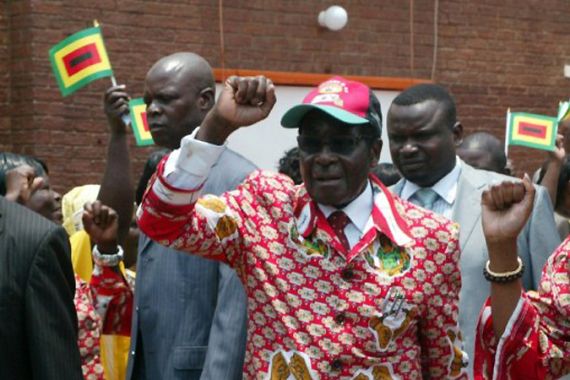Mugabe seeks early poll to end coalition
President makes case for elections next year to end fragile coalition with former opposition at annual party conference.

Robert Mugabe, Zimbabwe’s president, has called for elections next year to end a fragile coalition with the former opposition.
In an address to his ZANU-PF party’s annual convention in the city of Bulawayo on Thursday, 87-year-old Mugabe said he was confident his party would win the proposed polls.
“We’re saying time has come now to prepare for elections. We just have to have elections next year,” he said in a speech that lasted more than two hours. “Let’s go to an election so people can choose a government of their liking.”
Mugabe also used his address to denounce the so-called Arab Spring protests as a “Western intrusion on the African continent” and said he hoped early elections would ward off his co-ruling party’s western backers.
Al Jazeera’s Haru Mutasa, reporting from the conference, said Mugabe played to the crowd with emotive language by making a connection between the western-aided revolution that swept through Egypt, Libya and Tunisia and his own domestic concerns.
Open frustration
Openly frustrated with sharing power with Prime Minister Morgan Tsvangirai and his Movement For Democratic Change (MDC), Mugabe told a local paper the country’s power-sharing deal was “illegitimate, unconstitutional and had outlived its purpose” and had to go.
On Wednesday, he again criticised the MDC and the coalition, saying it was an impractical “patch on torn trousers”.
Mugabe, who has led Zimbabwe since independence from Britain in 1980, is expected to be formally endorsed as ZANU-PF’s presidential candidate at the conference that ends on Saturday.
Our correspondent said for many ordinary Zimbabweans, the conference is of little significance, although many do fear that an early election could bring a wave of unrest similar to the one that marred polls in 2008.
Mugabe, in his address, said there was no need for coercive poll campaigning or political violence because voters supported his party’s “progressive ideas” to economically empower ordinary Zimbabweans.
But the country, once touted as “Africa’s breadbasket”, has slumped from a thriving agricultural powerhouse into near grinding poverty where many of the most basic items come from neighbouring southern African countries.
Mugabe was elected into power in 1980 as one of the leaders of the country’s liberation movement against white-minority rule. He has served as the first executive head of state since 1987.
In recent years, Mugabe, who turns 88 in February, has been the source of heightened media speculation because of alleged health concerns – many of which have appeared unfounded.
With additional reporting by Al Jazeera’s Rezaa Kasu.